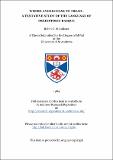Where angels fear to tread : a tentative study of the language of prehistoric Basque
Abstract
This work is an investigation into the possible age of part of the lexical content of the Basque language-today a linguistic isolate in the western Pyrenees. It examines firstly the chronological development of the various fanciful and contradictory theories as to the origins and antiquity of the Basques and their unique tongue with the aim of dismissing these ideas in favour of the prevalent local or Indigenista theory about their origins. Secondly, by combining linguistics and prehistory, with the archaeological and anthropological background of the region, this work endeavours to uncover possible traces of the pre-metal ages i.e. the Neolithic, Mesolithic and even further back, the Upper Palaeolithic in the roots of the present day vocabulary of Basque. Archaeologically, there is as yet no concrete evidence which would suggest any sizeable migration into the Franco-Cantabrian zone of foreign peoples who could have brought the Basque language or something of it with them and this is fundamental to the whole argument. As long as there is a lack of archaeological or anthropological proof of any new arrivals into the region strong enough both numerically and culturally to have been capable of imposing a new language onto the native Western Pyrenean people, then the idea that something of the various -lithic ages in the area could still remain embedded in the lower lexical strata of the Basque tongue today could possibly have some foundation. Admittedly, the immense time-span involved in this argument together with the absence of written records as regards prehistory constitute the main source of criticism of this theory yet the survival of the Basques and their language today testifies to their ability to absorb outside influences and still retain the basic character and structure of their pastoral society which itself is thought to date right back to the Neolithic Pyrenean Culture of the region.
Type
Thesis, MPhil Master of Philosophy
Collections
Items in the St Andrews Research Repository are protected by copyright, with all rights reserved, unless otherwise indicated.

